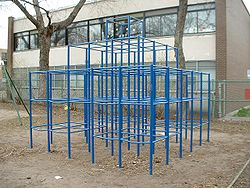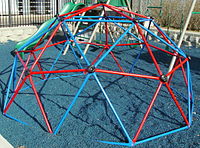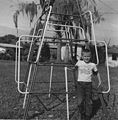- Jungle gym
-
The jungle gym, monkey bars, or climbing frame, is a piece of playground equipment made of many pieces of material, such as metal pipe or rope, on which children can climb, hang, or sit. The monkey bar designation refers to the rambunctious, climbing play of monkeys.
Contents
History
A home-use Lifetime dome climber
The first jungle gym was invented in 1920 and patented by lawyer Sebastian Hinton in Chicago.[1] It was sold under the trademarked name Junglegym. The term "monkey bars", was first documented in 1955,[2] though Hinton's initial patent of 1920 appeals to the "monkey instinct" in claiming the benefits of climbing as exercise and play for children,[3] and his improvement patents later that year refer to monkeys shaking the bars of a cage, children swinging on a "monkey runway", and the game of "monkey tag".[4] Hinton's father, a mathematician, had built a similar structure from bamboo when Hinton was a child; his father's goal was to enable children to achieve an intuitive understanding of 3-dimensional space through a game in which numbers for the x, y, and z axes were called out and each child tried to be the first to grasp the indicated junction. Thus the abstraction of Cartesian coordinates could be grasped as a name of a tangible point in space.[5]
Hinton's second prototype jungle gym is still standing at Crow Island School.[5][6]
Varieties
Large, metal, geometric-shaped jungle gyms were once common on playgrounds, but they sometimes led to injuries when children hit their heads on the bars or swung on them improperly, causing bruises, sprains and fractures. Newer jungle gyms are often made of alternative materials, including PVC, other plastics, rope varieties, wood/pipe and other materials. Non-metallic jungle gyms have the advantage of being user-friendly even on a very hot or very cold day, because they do not get too hot or too cold to the touch. Jungle gyms and monkey bars made of PVC and plastic flex when struck; absorbing the impact better than a more-rigid metal models. PVC and plastic will not rust, even in the wettest of climates.
Geodesic-shaped jungle gyms (monkey bars) provide benefits over ladder-rung models because they develop a broader range of muscles, including those in the legs and abdomen, in addition to the traditional development of arm muscles. Geodesics also develop eye-hand coordination, planning skills, and other benefits. A geodesic allows a child to rest before continuing on - with minimum effort; a benefit not afforded by ladder-rung-type bars. Some studies even suggest that a geodesic can improve a child's math and reading skills.
Jungle gym shapes may include wooden platforms with ladders and railings around the outer edges. A variety of shapes are seen in school playgrounds, parks, and backyards, including geodesics, rocket-shaped structures, and other configurations.
One common type of jungle gym is a row of overhead bars, high enough for a child to hang from, but not so high as to cause serious injury in a fall. A child can "walk" hand-over-hand from one end to the other.
Safety
To reduce the risk of injury from falls, jungle gym areas often have a thick layer of wood chips or other impact-absorbing material covering the ground; the National Safety Council recommends that playgrounds have at least 12 inches (30 cm) of such material.[7]
See also
External links
-
References
- ^ Hinton's original patents for the "climbing structure" are U.S. Patent 1,471,465 filed July 22, 1920; U.S. Patent 1,488,244 filed October 1, 1920; U.S. Patent 1,488,245 filed October 1, 1920; and U.S. Patent 1,488,246 filed October 24, 1921.
- ^ Merriam-Webster's Collegiate Dictionary (11th ed. ed.). Merriam-Webster, Inc.. 2003. ISBN 0-87779-807-9.
- ^ In U.S. Patent 1,471,465 Hinton wrote on page 3, "Again and importantly, the monkey instinct strong in all human beings and perhaps more clearly displayed in children, makes climbing a sport to which children enthusiastically take, by a psychology about the same as that of a kitten at play with a ball, which of course is practice for hunting."
- ^ In U.S. Patent 1,488,244 Hinton wrote on page 3, "I have found, however, that children seem to like to climb through the structure to some particular point, and there swing head downward by the knees, calling back and forth to each other, a trick which can be explained of course only by the monkey instinct." and on page 4 he wrote, "I make considerable point of the great strength of the structure, as this is important. Thus most persons have seen a monkey in a zoo, seize the bars of his cage with hands and feet and throw his body violently back and forth, other monkeys following suit. Children in the structure I have erected do the same thing, apparently unconscious of any imitation of monkeys. It can be appreciated that with twenty-five or thirty heavy boys doing this, the strains on the structure are very great."
- ^ a b "J" is for Jungle Gym from Winnetka, Illinois Historical Society
- ^ Crow Island School history
- ^ Playground Safety - National Safety Council
Categories:- Play
- 1920 introductions
- Backyards
Wikimedia Foundation. 2010.








